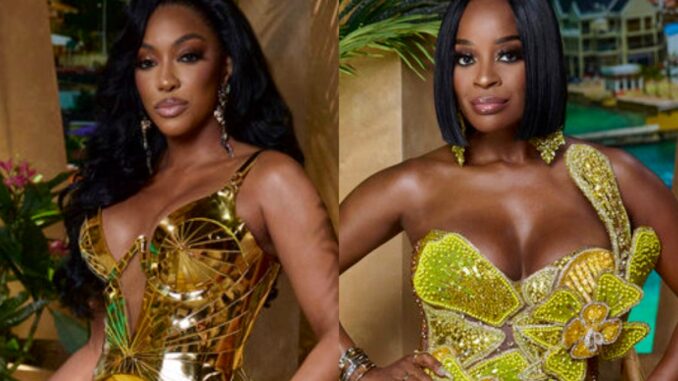
The glittering, often tumultuous world of reality television, particularly the gilded cage of the Real Housewives franchise, is a peculiar incubator for friendships. Bonds forged over champagne flutes and shared grievances can feel as real and enduring as any in the "outside" world, yet they exist under a constant, magnifying scrutiny that few relationships can withstand. Such is the tragic narrative of Porsha Williams and Shamea Morton, whose once-unbreakable sisterhood on The Real Housewives of Atlanta fractured and ultimately crumbled, leaving behind a stark illustration of how loyalty, truth, and the relentless glare of the spotlight can unravel even the deepest of ties.
For years, Porsha and Shamea were the embodiment of ride-or-die friendship. Shamea was Porsha’s steadfast confidante, her sounding board, the reliable presence through Porsha’s various romantic travails and public controversies. She was the bridesmaid, the cheerleader, the one who would verbally spar with Porsha’s enemies on her behalf. Their laughter was infectious, their bond seemingly impermeable, built on shared history and an almost visceral understanding. Yet, beneath the surface of their easy camaraderie lay the subtle fault lines – the differing expectations of loyalty, the varying tolerances for discretion, and the inherent tension of one friend always playing second fiddle in a world obsessed with the primary storyline.
The initial cracks were perhaps subtle, a series of micro-aggressions and perceived slights that chipped away at the foundation. Shamea often expressed feeling like she wasn't truly in Porsha's innermost circle for the biggest life events, sometimes hearing major news (like Porsha's engagement to Dennis McKinley) through the grapevine rather than directly from her best friend. For Porsha, her primary loyalty often shifted to her romantic partners, a common, if sometimes isolating, pattern for many. But for Shamea, a friend who had been there through so much, these instances carried the sting of exclusion, the ache of being sidelined.
The true wedge, however, was driven in by a series of events that exposed fundamental differences in their values, particularly concerning truth and loyalty in the face of public scrutiny. The infamous Bolo/strippergate scandal became the crucible. As whispers and outright accusations about the events of Bolo’s adult entertainer performance at Cynthia Bailey’s bachelorette party swirled, Porsha, along with Phaedra Parks (and later Marlo Hampton and Kandi Burruss), became entangled in a complex web of denials and half-truths. Shamea, a straight-shooter by nature, found herself caught in the crossfire. She was present at the party, privy to some of the events, and held an unyielding belief in candor.
Porsha, on the other hand, was navigating a difficult personal narrative and, arguably, attempting to control a damaging public perception. She expected absolute, unquestioning loyalty from her friends, even if that meant participating in a shared silence, or at times, a shared denial. When Shamea, feeling pressured and unwilling to compromise her integrity, spoke her truth about elements of the night – a truth that contradicted Porsha's carefully constructed narrative – it was perceived by Porsha not as honesty, but as the ultimate betrayal. For Porsha, Shamea's transparency was a stab in the back; for Shamea, Porsha's expectation of complicity was a demand for her to sacrifice her own character. The clash was irreconcilable: loyalty versus truth, discretion versus candor.
The final, devastating blow, the one that cemented the irrecoverable distance, came with Porsha's whirlwind engagement to Simon Guobadia, the ex-husband of her former castmate Falynn Pina. For Shamea, this news, once again, was not delivered personally and privately but exploded onto social media, a public declaration that left her reeling. It was not merely the surprise, but the profound realization that despite their years of history, the deep roots they had cultivated, Shamea was still not deemed worthy of being in Porsha's inner sanctum when it truly mattered. It underscored Shamea's long-held feeling of being on the periphery, a secondary character in Porsha’s life, particularly when new, dramatic romantic storylines took center stage.
In the end, the friendship between Porsha and Shamea became a casualty of misaligned values, the inherent pressures of reality television, and perhaps, the natural evolution of two women whose paths diverged under the weight of fame and personal choices. Porsha sought fierce, unwavering loyalty, even if it meant navigating a complex truth. Shamea prioritized her integrity and expected reciprocal candor. The relentless digital echo chamber amplified every perceived slight, every whispered disagreement, transforming private frustrations into public feuds. Their story is a poignant reminder that even the strongest bonds, when subjected to the crucible of public performance and differing moral compasses, can fray, unravel, and ultimately, become just another memory in the grand, dramatic tapestry of a reality television dynasty.
